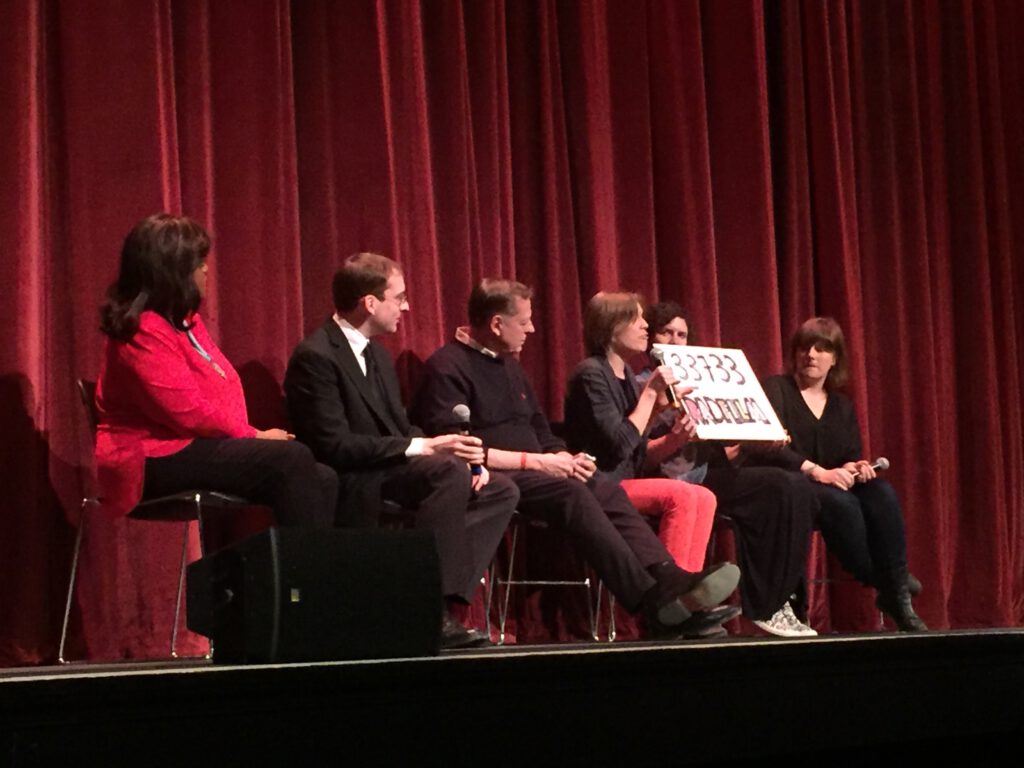Editor’s Note: The following article was written by Ebert Fellow Shalayne Pulia of The Daily Illini.
There’s an intersection at the corner of church and state that’s enough to make any journalist or conscious citizen wary. It’s a place with deep roots that we don’t often touch. But when a film does, successfully, it has quite a lasting impact tugging at our empathy—the kind of empathy Roger Ebert championed.
Screening last weekend at Ebertfest, director Rebecca Parrish’s “Radical Grace” documented the experience of several nuns targeted by the Vatican as “radical feminists” via a censure issued in 2014. They were suspected of disobedience to laws of the Roman Catholic Church.
Parrish gave the film a raw quality that felt genuine and allowed the audience to connect on an innately human level. Such is the nature of documentary filmmaking to appear more vulnerable. However, this film has a particular potency due primarily to its cohesive storytelling.
This is not a religion film. It’s a film about standing up for your own beliefs and refusing to let anyone, even the Vatican, tell you to sit in silence.
“It was tremendously inspiring,” said Parrish in the Women in Film panel on Friday morning. “Part of the reason that I wanted to make this film is that I wanted [the nuns] to rub off on me.”
Parrish took the stage today at Ebertfest to introduce her documentary with a newfound composure, noticeably more confident than her introduction at the Women in Film panel on Friday morning. After a standing ovation from the audience following her film’s 2:00pm screening at the Virginia Theatre, it’s clear the nuns’ resolute nature sparked something in her and the crowd.
“Radical Grace’s” success stems from a comprehensive picture of the nuns’ struggle which Parrish provided in a stunningly clear composition. It follows multiple nuns over the course of five years, including planning for the film. The intimate experience with these women shines light on human qualities often denied those belonging to the religious community.
They swear. They wear normal clothing. They are not perfect, but they do reach to the fringes of society by becoming approachable and lobbying for social justice.
But that’s where the state comes in, and where their problems begin.
The film’s title hones in on some of this ambiguity in reclaiming the notion of what is “radical.” It’s an adjective that strikes at the heart of feminist issues today. What exactly is “radical feminism?” What traits are attributed to the word itself?
In an interview after the screening, Parrish spoke about the purpose of this title’s complexities.
“It can mean a lot of different things, and all the meanings are true … What the debate gets into, and you heard it from Father Pfleger today too, is do you accept that label, ‘radical’? Or do you challenge it?”
Parrish went on to say that she welcomes the title for her political stances. However, it makes sense that Sister Simone would push back against it.
“Radical feminist was a charge [in the 2014 censure and investigation of nuns in the United States]. You have to get into what the origin was for the language that’s in there.”
It’s a film of defiance not for the sake of defying but for the value of human life, reclaiming ownership over this great individual power to lobby for communal support, as Sister Simone Campbell did and continues to do with her NETWORK group. They organized the Nun’s on the Bus traveling troop of nuns devoted to working within the bounds of policy and lawmaking to help those they see in need.
Parrish’s intense attention to detail and dedication to depicting these women as they truly are is a testament to how much this project meant to her. She created a film that is not only for those involved in the Catholic Church, but also for a crowd much like the Ebertfest audience—diversified but grounded on the base of empathy. It transcends religion. There’s a call to action and the realization that purpose can come from within, just as easily as from on high.











